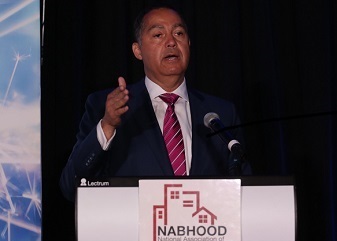By Berkeley Lovelace Jr.
WeWork could default on some of its real estate obligations as it struggles to raise fresh funding following the office-sharing firm’s failed initial public offering, mega-developer Don Peebles told CNBC on Tuesday.
Peebles, the CEO of privately held real estate firm Peebles Corporation, said, “Anyone looking at a building that has got significant WeWork occupancy has got to be very concerned.”
"I think some defaults by WeWork are coming down the line," Peebles said on The Exchange.
Peebles said that buildings in which WeWork is listed as a tenant are going to be penalized in their capitalization rate, a measure by which real estate investments are assessed for their profitability, when they go to market.
WeWork’s business involves taking on long-term leases and then renting out the spaces to start-ups, freelancers and enterprises for the short term. The company makes money over time as companies and individuals pay their rent or membership.
The start-up announced its intent to go public on Aug. 14, revealing massive losses and a confusing corporate structure. Since then, the IPO for WeWork’s parent company, The We Co., has been hanging in the balance, as it delayed its investor roadshow amid weak demand and a dwindling IPO valuation.
The company announced Monday it would withdraw its S-1 filing amid the turmoil.
It’s possible that WeWork will see a “significant pullback” in access to any kind of capital, Peebles said, adding it will likely need to give back property to stay in business. “I’m not sure lenders would see them as a significant investment opportunity anymore.”
— CNBC’s Annie Palmer contributed to this report.

By Breanna Chianne
The United Negro College Fund has done it again! A celebration of 75 years of greatness led into a bash of charitable accomplishments.
"A Mind Is..." Summer Benefit Gala kicked off in New York last Saturday (Aug. 3) as it honored Sharlee Jeter, Vice President of Strategy and Development at Jeter Ventures and R. Donahue Peebles, the CEO of real estate investment firm, The Peebles Corporation. Recognizing their strives to promote the value of education introduced their success in raising over $350,000 for students to attend historically black colleges and universities.
Kathy Hughes, founder of Urban One, welcomed R. Donahue saying:
“Don has single-handedly replicated himself thousands of times over by embracing underprivileged youth, encouraging them and instilling in them the desire to do whatever they have the potential to do.”
The grand amount was given to the UNCF, along with a check from New York Comptroller Thomas DeNapoli for $60,000. The donation was gathered due to "unclaimed funds from the state," according to Bossip.
Previous scholarship recipient Kristen Gordon expressed the impact UNCF's generosity has had on her life by graduating from Spelman College.
“Within time, I was awarded the ability to finish my journey at a place I had learned to call home. Without this scholarship, I honestly do not know if I would have been able to stand in front you all as a graduate of the number one HBCU in the world!”
https://www.iheart.com/content/2019-08-07-uncf-raises-over-350k-for-college-students-tuition/

By Sophie Kaplan - The Washington Times
Jason Wallace says he knows the people he helps as the director of the D.C. Mayor’s Office on Men, Fathers and Boys someday will be role models for his own son.
“My son will be inspired from the boys that we’re inspiring today,” said Mr. Wallace, whose son is 2 years old. “This is very personal to me.”
Mr. Wallace’s work centers on creating opportunities for men and boys of color to have role models.
His office’s three goals are to: set up programs and opportunities to empower boys for greatness; close achievement gaps using government resources, nonprofits and programs; and help fathers build connections with each other and their sons.
Mr. Wallace’s average day reflects those goals. On a stage at Google’s office in Northwest on Monday, he moderated a conversation between Don Peebles, a D.C. native and one of the wealthiest black businessmen in the country, and his son Don Peebles III about their relationship, the real estate business and resources available to audience members looking to start businesses.
Every other month, the office hosts a Father Fun Day, an outing or activity provided at no-cost for cash-strapped families. The office has taken fathers and sons to a Washington Nationals baseball game and a fishing trip, and is planning a golf trip for the next outing. The activities also help create community among fathers.
“I’m 34, and I still don’t know what I’m doing,” Mr. Wallace said of being a dad. “I can’t imagine a 17-year-old or an 18-year-old that has a child, feeling comfortable.”
A study conducted by Color of Change, a nonprofit civil rights advocacy group, found that 59% of poor families depicted in the news media were black while only 27% of families living below the poverty line are black. The study found that the media regularly overrepresents blacks as criminals and black fathers as absent.
Mr. Wallace’s office is set to launch next month a flip-the-script campaign to challenge those negative media stereotypes with positive images of men of color and their families on social media and public transportation around the District.
“And because [black boys] don’t have positive images of what positive black people look like” have negative expectations about what they will become, the director said.
Inspired by actress Jada Pinkett Smith’s Facebook Watch show “Red Table Talk,” Mr. Wallace is hosting his own show on Facebook Watch called “Manuscript,” where he will talk about men’s mental health relating to topics such as incarceration, grief and fatherlessness.
“There’s a ton of men that are dealing with the same thing and it’s OK to be vulnerable,” he said. “It’s OK to say that I need help to say that your feelings are hurt.”
The six episodes of the first season will come out in early September.
Once all of the initiatives are in motion, the Office on Men, Fathers and Boys will be able to measure its success in achieving its goals.
For example, one program that will start this fall is a peer mentorship program in which high school students will mentor elementary school boys.
The office is keeping track of how many students are participating in this program, how many mentorship sessions are completed and changes in grades and truancy for the students.
“Closing the achievement gap is ensuring that these boys show up for class,” Mr. Wallace said.
In addition to the office, there is a commission of 11 people who make legislative and policy recommendations to address challenges that men of color face. Mr. Wallace said they are working on legislation about health, well-being and reentry to society after incarceration.
There are of course many organizations that are focused on addressing the challenges fathers, men and boys of color face, but this is the only city in the country, that Mr. Wallace, is aware of, that has an office like this and he wishes more people knew about it.
https://www.washingtontimes.com/news/2019/jul/30/dc-mayors-office-on-men-fathers-and-boys-aims-to-c/
NABHOOD 23rd Annual Intl. African American Hotel Ownership & Investment Summit & Trade Show in Miami

For more information about NABHOOD, please click the below link:

Words by Matt Pressberg
Photos by Noah Stone
Don Peebles Jr. had it all planned out. He was going to major in pre-med at Rutgers University, move on to medical school, and become
a doctor to establish some financial security. Then he’d use his income to invest in real estate and get really rich. He even had a role model in his uncle in New Jersey, who had done the same and lived a very comfortable life as a successful doctor.
But as a 19-year-old, he had an epiphany: Why not just cut out the first step?
He set a goal to become a multimillionaire by the time he would have graduated from medical school at 26 years old. He got there.
Peebles, now the founder, chairman, and CEO of New York-based Peebles Corp., is one of the wealthiest real estate developers in the United States, with Forbes estimating his net worth in excess of $700M. But the quiet force and longtime D.C. power player is now stepping into a brighter spotlight with his largest project yet in a land where many come to make it big: Los Angeles.
Peebles, 59, recently visited the location of that project, Angels Landing in Downtown Los Angeles, set to debut in 2024. The $1.6B residential, hotel, and retail complex that sits on a vacant parcel on Bunker Hill will feature an 80-story skyscraper, making it one of the tallest buildings in the Western United States. The plan is to build a vertical community to tie together one of the more jointed areas of L.A.’s bustling core.
CSQ caught up with Peebles at the Waldorf Astoria in Beverly Hills after a long day of site tours to find out more about his path to success—and where it might be headed next.
Made in America
Roy Donahue Peebles Jr. was born in 1960 in Washington, D.C., to a 19-year-old mother. His parents divorced when he was five. Although his family struggled financially, his enterprising mother exposed him early on to real estate and politics. She became a real estate salesperson and broker as a way to make extra money to support the family when they were living in Detroit for a few years, and a young Peebles filed that away as a possibility to support himself in the future.
The family eventually returned to D.C., where Peebles got his first white collar job (he’d held the positions of gas station attendant and janitor previously), as a page in the House of Representatives on Capitol Hill during his last two years of high school. He was then an intern for two members of Congress, and during his senior year, served as a full-fledged staff aide for another member of Congress.
In order to do that work, Peebles attended a special school for pages. Classes were held on the top floor of the Library of Congress and began at 6 a.m., which meant he had to wake up at 4:30 a.m. to catch the bus. He would be in class until about 10:30 a.m., then cross the street to get to work at the U.S. Capitol. “I got a great education about life, politics, and how the world really works,” he says.
On top of that, Peebles was on the school basketball and chess teams, which meant he sometimes wouldn’t get home until 10 p.m. That was followed by at least two hours of homework and another pre-dawn wake up the next day.
After high school, Peebles went to Rutgers University in Newark, New Jersey, where he studied pre-med and worked part-time at his uncle’s office and in the local office of Rep. Peter Rodino.
“I was kind of bored with school,” he says. “I wanted to be busier.” So, at the end of his freshman year, Peebles decided to try real estate. He planned on giving it a year, going to college part time in D.C. and getting his real estate salesperson’s license.
The problem was, this was 1979 when interest rates were 25 percent. Peebles was a great salesman, but few people could qualify for loans to pay for houses. Nevertheless, by his sophomore year, he was dead set on becoming a real estate mogul.
Raising Capitol
After leaving school, Peebles shifted gears and hung a shingle in D.C. as a real estate appraiser. In 1982, Marion Barry, whom Peebles had befriended as a teenager, ran for re-election as the mayor of Washington, D.C., and won. Since moving back, Peebles had become close with several of Barry’s staffers. He was offered a position as chairperson of the real estate commission. He wasn’t able to hold that role since he was a licensed salesperson and not a broker, but was urged to consider a different position: on the property tax appeals board.
The next year, he politically maneuvered his way to become chairman of one of the most important real estate boards in D.C., at age 24. He continued building his real estate appraisal business, but in 1986 a real estate opportunity crossed his desk that would be pivotal in his career. He was just turning 26. It was in an area targeted for economic development by the mayor, with whom Peebles had a strong relationship. He got the city to pre-lease office space in the building. Then, he found some investors and got half the deal. “I understood how politics and business are interconnected,” he says.
Peebles had been looking at development sites that were owned by the city of D.C. When he started his appraisal business, he’d taken more office space than he needed because he got a good deal and sublet extra space to two real estate brokers. One of those brokers helped him find investors for a development deal he was putting together.
That deal didn’t get done, but the other subtenant came through with an opportunity just in time. “He presented a development site in this area that was targeted [by the city] for economic development and a letter from the mayor proposing to lease office space to be built on that site by a developer,” Peebles explains. “But the developer didn’t have control over the site, because he was haggling over the price.”
Peebles made a deal to pay the seller the asking price but asked for more time. He approached the investors from the other deal to ask how they’d like a deal to lease to the government for 20 years. Peebles still owns the property today, where his son is overseeing renovations.
Once he did that deal, he left the board to market and grow his business helping property owners appeal their tax assessments. Then the S&L crisis hit. It was a disaster for most real estate investors—but not Peebles.
“Property values were plummeting, so my tax appeals business skyrocketed. I was getting a lot of cash coming in,” Peebles says. “So I took the cash and started buying properties. Many of my clients lost their properties and the banks would hire us to do assessment appeals. Sometimes I would buy properties from the banks or federal regulators when the banks were closed.”
Beyond the Beltway
In 1990, Barry was arrested after being caught smoking crack cocaine in a police sting operation. “The politics changed in the city for a period of time, so I had to look at alternatives,” Peebles says.
He got involved in national politics, serving on Bill Clinton’s national finance committee during the 1992 presidential race. But his old friend Barry had an improbable comeback, winning election as mayor of D.C. again in 1994. At the time, Peebles was negotiating with the city for two buildings. Despite what he says was a far superior offer, Peebles lost the deal. He took it as a sign that the climate had changed for him in D.C. and decided to take a vacation somewhere warmer. He and his new wife, Katrina, headed to Miami.
The two of them quickly fell in love with the energy of the city and decided to buy a vacation home there. Again, his timing was perfect, with Miami at the start of a real estate boom. While spending the holidays at that vacation home, Peebles read about a hotel site in Miami Beach. The Shorecrest Hotel had recently been purchased for $900,000, but was now on the market for $5M, Peebles recalls.
What really caught Peebles’ eye was that the site was situated next to the Royal Palm hotel, which was owned by the city of Miami Beach. The city was looking to develop the site, and its request for proposal called for an African-American developer to be majority owner. Miami-Dade County was coming off a three-year boycott led by the African-American community, which targeted the region’s economic lifeline, the tourist industry. Peebles was the right developer at the right moment.
He called the broker who rented him his Miami Beach apartment and said he wanted to see the Shorecrest and get a copy of the RFP for the Royal Palm. Then he went back to D.C. “On the flight back, I told Katrina, ‘Look, we’re going to bid on this hotel project, and we’re going to win it, and it’s going to change our lives,’” Peebles says. Wasting no time, Peebles began composing the proposal on the plane.
Peebles approached the team of Hyatt heir Nick Pritzker and Craig Robbins, his biggest competitor for the project, with an offer to work together and build a Hyatt-flagged hotel on the site. But they blew him off. Another local developer said, “there was no way a black
guy from Washington, D.C., who hasn’t done anything here was going to win the site,” Peebles recalls. That only motivated him more.
They also underestimated his political ability. Peebles was a savvy operator who was experienced in partnering with government entities and capitalizing on opportunities set out for minority developers. He also had some Clinton connections that came in handy. After a hard-fought battle, Peebles was approved as developer of the Royal Palm in June 1996.
It was the biggest project he’d ever built. And it turned out that not winning those deals in D.C. was a bigger win.“It taught me the most important lesson,” he says. “Setbacks are opportunities in disguise.” It also forced him out of a comfortable path in D.C. “I would have stayed just like many developers do, in the same place,” he says. “And my life would have been totally different.”
Club Made
Peebles was just getting started in South Florida, and as has been typical in his career, his timing was impeccable. The condo craze was exploding, and business was booming. A broker told Peebles that Miami Beach’s historic Bath Club, essentially a country club on the ocean, was in financial trouble and was going to sell. One other thing: It was a “restricted club” that didn’t allow black or Jewish members. “I got to buy a site and also make a point,” Peebles says.
To try to survive, the club had its property downzoned to reduce property taxes. Then a law was changed that limited upzoning, which
kneecapped its value. However, during his due diligence, Peebles’ team discovered a technicality that eventually allowed him to get the
club rezoned. He developed condos on the site and overhauled the club in 2007 to have it function as an event venue. Now, the club
is going over another overhaul to relaunch at Art Basel in 2019 as a private club with just 200 coveted memberships being offered.
From there, Peebles saw a lot of possibilities and his goals and desires grew bigger and more national. His wife had lived in San Francisco,
so he bought properties in the Bay Area. He bought the offices of Internet ad service DoubleClick and sold for twice the purchase price.
He also sold the Royal Palm, in December 2004 for $127.5M, the highest-ever price paid at the time for a Miami Beach hotel. (It is now part of Marriott’s Tribute Portfolio line.) He finished work on the Bath Club and sold all of the condos by 2006
When Peebles built his first building in Washington, D.C., he donated 10 percent of the proceeds to a nonprofit community development organization. The head of that organization called Peebles one day to ask his opinion about a condo in Miami. The friend had taken out a second mortgage on his D.C. house to put a down payment on a condo and flip it before closing, because he couldn’t afford the mortgage. “If that’s who is buying condos, all these buildings that I think are sold out are not really sold out,” Peebles says. “The supply is even greater than statistics are showing. We’re done in this market for a while.”
Escape to New York
Peebles was relatively unscathed by the 2008 financial crisis, but the end of the last decade was challenging in other ways. He lost both
parents and an in-law in a two-year period, and he and his wife decided to move to New York in fall 2011, where he made an immediate impact. In 2013, he was awarded the largest single building sale in New York City history by the administration of then-mayor Michael Bloomberg, at 108 Leonard Street. “I learned, again, that the public-private deal structure and the political skills I had developed as a teenager in Washington, D.C., were very portable,” he says.
He started developing in other cities, including Philadelphia, Boston, and Charlotte, North Carolina. Now he’s in Los Angeles for the biggest project of his career and the last one he’ll actively lead himself. “The nice thing about starting your real estate development career at 19 is that you can have lifetimes of success and still be a relative youngster,” he says.
Making an Impact
Peebles says his proudest accomplishments are his children, Don III and Chloe. Don III is already making his presence felt in the family
business. “He’s got me focusing on affordable housing,” Peebles says of his 25-year-old. “He wants to do something to make an impact. I’m
very optimistic that the company I’ve built and the values I’ve worked for will evolve into even a better place through the efforts of my children; they are good people.”
In response to the lack of gender and racial diversity in the real estate development business and the increasing shortage of affordable
housing, Peebles is starting a fund to invest in developers of affordable housing to help address the crisis in cities like Los Angeles and
San Francisco. Peebles says supporting emerging, early career developers who are building midsize complexes with units not marketed
toward out-of-town investors but working locals can help boost available supply. He’s putting his money where his mouth is, starting
a fund focused on urban infill and workforce housing. The fund will invest in projects mostly in the $20M to $50M range. He’s setting a goal for the fund to do 60 deals, with 10 of those in California, and he’s encouraged by the reception he’s getting from an evolving society.
“I see our society finally being compelled to look at things that are wrong and being able to dream about what can be and then going
out and demanding it,” he says, admitting it’s both altruistic and good business. “Those projects pay better returns than those big risky
projects you’re seeing now,” he says.
He also believes more has to be done to open up real estate development opportunities—among the greatest wealth generators—
to those who can’t tap establishment networks or rich family and friends to get started. He says that’s not the responsibility of the government, but the private sector. He’s tried to lead by example, showing that being more inclusive can bring greater success.
While Peebles has previously expressed interested in running for mayor of New York, that’s not in the cards now. There’s too many deals to be done. Others might want to rest on their laurels after 40 years of real estate development. But that’s why they’re not Don Peebles.
Please click on this link and see pages 64-71 for full publication.




To learn more about the Mission Society of New York and for ways to donate and make a difference please visit https://www.missionsociety.org
By Fred Clasen-Kelly and Danielle Chemtob

When Mecklenburg County commissioners agreed to sell 17 acres in uptown Charlotte, county leaders made a bold promise.
They said they would transform a vacant building, a little-used park, an aging office tower and parking lots in the former Brooklyn neighborhood into a bustling business district with offices, hotels, big-box stores and more than 1,000 apartments and condos. At the same time, officials said, the project in Second Ward would help house the poor.
But three years later, newly elected commissioners are questioning the deal and exploring if the county can renegotiate.
They’re upset by the prospect of giving up public land to developers likely to build upscale housing.
In recent weeks, the commissioners said they challenged the plan during private meetings with developers. They said they long opposed the redevelopment proposal or were elected by voters to protect green space.
The plan selected in 2016 commissioners selected in 2016 calls for about 1,200 new homes, but only about 114 would be affordable to families making up to 80% of area median income. That’s about $56,000 a year for a family of four in Charlotte.
Some commissioners are miffed the agreement shrinks a 5.5-acre park by more than half in a county ranked among the worst in the country for its amount park land.
Some commissioners said they are reviewing the agreement and would like to look into whether the county could renegotiate at least parts of the deal.
“The previous deal was done at a different time with different priorities,” said commissioner Susan Rodriguez-McDowell, who met with developers on May 1. “If (the developers) don’t make as much as money that doesn’t bother me.”
The opposition is significant because the current plan was passed on a 5-3 vote, according to an Observer report from June 2016. Two commissioners who voted against the proposal — Pat Cotham and Ella Scarborough — remain in office, meaning the majority of the board has indicated it does not support the deal as it exists.
Rodriguez-McDowell and fellow commissioners Susan Harden, Elaine Powell and Mark Jerrell said they all share concerns about the project.
But it is unclear how commissioners could change the agreement now. They said they don’t know if they can renegotiate the master redevelopment agreement signed last year.
Mecklenburg County refused to make administrators available for interviews. In response to questions from the Observer, the county provided written answers from Mark Hahn, director of Asset and Facility Management.
Hahn’s statement said the county has a signed agreement with developers from BK Partners and any changes would require cooperation from the business.
BK Partners is led by New York-based developer Don Peebles, one of the richest and most prominent African-American businessmen in the nation.
Peebles said he met with commissioners to hear their concerns, but said he told them the session was not meant to renegotiate the contract.
He said one commissioner suggested developers look into including micro-apartments, which are smaller and usually cheaper than standard apartments. Peebles said it was a good idea and that he would study it.
Still, Peebles told the Observer that he is dismayed that some commissioners would be so critical of a potentially $1 billion project that would provide work for minority- and women-owned businesses in an attempt to preserve roughly three acres of an underused park. His plan says 35% of the construction, engineering, other professional services or other work would to go to minority and women-owned firms, far exceeding the numbers offered by other developers who competed for the project, officials said.
Mecklenburg’s Minority, Women and Small Business Enterprise program sets more modest goals. That would include 21% participation for construction, 16% for architecture and engineering and 23% for professional services.
“This will be some of the first buildings in uptown that mean something for black Charlotte,” Peebles said.
Peebles said African-Americans and other minorities have been largely locked out of Charlotte’s real-estate boom, reflecting the city’s stark racial and economic disparities.
He said some commissioners mistakenly view the affordable housing included in the plan as racial justice.
“That’s a paternalistic way of looking at it,” Peebles said. “Give us economic opportunity and we will take care of our own.”
A GOOD DEAL?
For the last five years, Mecklenburg County leaders have made plans to take advantage of Charlotte’s booming real estate market by selling public land on the edges of uptown.
The idea is to take swaths of aging, sterile government buildings and parking lots and convert them into vibrant business districts filled with shops, restaurants, hotels and offices.
Commissioners agree that government land sales can drive development and generate revenue that can be used to build affordable housing and new green space.
But four commissioners elected to the nine-person board in November have questioned whether taxpayers got a good deal when commissioners decided to sell land that includes the former Charlotte-Mecklenburg Schools Board of Education building, Marshall Park and Bob Walton Plaza.
The county chose the offer from BK Partners over proposals from two other firms selected to submit plans, Crescent Communities and Citisculpt.
Citisculpt offered to pay as much as $40 million for the land, more than BK, which agreed to pay $33.7 million.
But the BK plan provided the most residential units, including affordable housing, office space and retail. And unlike the other plans, it did not require public money to complete.
The proposal from BK “fulfills or exceeds County objectives to create a mixed-used community,” a consultant’s report said.
PAYING LESS THAN MARKET VALUE
Under the agreement, BK Partners doesn’t have to pay the county for the land anytime soon.
BK Partners plans to complete the project in three phases.
After site plans and other details are finalized, the developers will have 18 months to close on the land involved in the first phase.
Tax records suggest that the $33.7 million that BK Partners agreed to pay for 17 acres is far less than others recently paid for uptown real estate.
In 2016, the same year BK Partners was selected, local developer Lincoln Harris and Goldman Sachs paid about $37.5 million for 10 acres near Stonewall and South Tryon streets, where The Charlotte Observer was once located.
On Stonewall Street, the 4.2-acre retail portion of the Stonewall Station development sold last year for $34 million.
Dennis LaCaria, who led negotiations for Mecklenburg County until he left the government earlier this year, said the county had to sell at a price below market value because officials wanted developers to include affordable housing and preserve park space.
He noted that the city of Charlotte did not require affordable housing when it sold the land that became Stonewall Station.
“When you’re talking about fair market value, it’s gonna be market driven,” said Lacaria, who was a senior executive in the county manager’s office. “If you want (affordable housing and green space), there has to be a way to subsidize that.”
INHERENT RISKS
Mecklenburg officials and developers originally said the redevelopment would take 10 years to complete. They said they would mostly finish phase one within five years.
The county now says the project might be finished in 12 years.
Since commissioners picked BK Partners in 2016, the developers and county staff have been working on due diligence, testing soil, developing a master plan and design, negotiating and agreeing to contracts and designing the project.
Monte Ritchey, president of local development firm Conformity Corp., part of BK Partners, said developers are now gauging interest of local and national retailers. They’ll also have to submit a site plan to the county, which Ritchey suggests will occur in the third or fourth quarter of this year.
They also may need to convince city of Charlotte officials to rezone the property, a process that often takes months.
The statement sent by Fair, the county spokesman, said the immense size of the project — more than 2 million square feet of retail, office and homes and other features — means it will take longer to complete than the typical project.
Tom Murphy, former mayor of Pittsburgh and senior fellow at the Urban Land Institute, said there are inherent risks in major redevelopments, especially since they can take years to complete.
“The political climate of Charlotte could change,” Murphy said. “The economics in the world could change dramatically. There’s all kinds of things that can happen between now ... and then when you get under construction.”
He and others said that a developer is unlikely to start construction if there is a downturn in the economy, which can cause further delays and uncertainty.
ABANDONED PROJECTS
In 2013, Peebles planned to build apartments, shops and a hotel in Miami, but walked away from the deal three years later, according to a 2016 report from the Miami Herald.
In March, Peebles’ company abandoned a hotel and condo project in Washington, D.C., amid legal squabbles, according to a report in the Washington Business Journal.
Peebles said he turned away the Miami development after determining it was not financially viable.
In the Washington project, he said his company plans an agreement to build affordable housing at another site even though the deal fell through.
Peebles acknowledged real estate is a cyclical business, but said he is confident the uptown Charlotte redevelopment will be successful.
He noted Charlotte’s growing population, a need for more hotel rooms and a business-friendly environment.
The county statement from Fair acknowledged that a previous deal with a local developer for part of the Second Ward property failed at least in part because of the Great Recession.
The statement said there is less concern about the current deal because Peebles as a national developer has more financial resources to weather a recession than a lone local developer.
“With a sound agreement in place and continued growth in Charlotte, this development opportunity should remain attractive to the developer,” the statement said.
REPUTATION ON THE LINE?
The Second Ward redevelopment carries historical significance.
Once called the Brooklyn neighborhood, it was an African-American enclave bulldozed and replaced with bland government buildings in the name of urban renewal during the 1960s and ’70s.
The Government Center, county courthouse, jail and other municipal buildings now occupy land bordered by McDowell, Stonewall, Third and South Tryon streets.
Some commissioners say that’s why it is important to ensure the redevelopment includes affordable housing that will allow for more diversity.
A city report says Charlotte needs about 34,000 units of affordable housing to meet demand, mostly among people making less than $25,000 a year. That means 114 units built over a decade is insufficient, some commissioners said.
“I’m concerned with how this could become just another luxury space for rich people uptown,” said Rodriguez-McDowell, the county commissioner. “It’s just more luxury-style apartments and condos. I asked about doing something with lower prices and they said ‘That’s not how it is done.’”
Commissioners Chairman George Dunlap and others have continued to support the project.
At a board meeting in March, Dunlap defended the selection of BK Partners. He noted that developers had promised significant participation from minority- and women-owned businesses.
Dunlap and others said people who once lived in the Brooklyn neighborhood should have their legacy honored in the new development. They are not worried about the size of the park, he said.
“Persons that lived in Brooklyn Village and relatives of those that lived there questioned the concern about a five-acre park; because they said there was never a park in Brooklyn,” Dunlap said, according to meeting minutes kept by the county.
Commissioner Pat Cotham voted against the BK Partners proposal in 2016, saying that it did not include enough affordable housing or preserve enough green space.
However, Cotham said, trying to renegotiate now risks the county’s reputation with the business community.
“We can’t get years down the road and then say ‘Let’s change it,’” Cotham said. “No one would want to do business with us again.”
The Charlotte Observer article can be found here
THE PEEBLES CORPORATION®
NEW YORK
BOSTON
WASHINGTON, DC
CHARLOTTE
ATLANTA
MIAMI BEACH
SAN FRANCISCO










